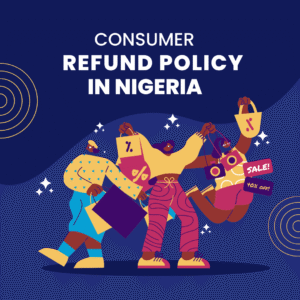Introduction
In a rapidly evolving consumer market, the right to seek redress, particularly through a refund, has become a fundamental aspect of consumer protection globally. In Nigeria, and under the Federal Competition and Consumers Protection Act (‘FCCPA’), 2018, consumers’ rights are highly protected, and businesses are enjoined to ensure fairness, transparency, and accountability in their dealings with consumers[1]. The Nigerian legal system provides a basis for consumer refunds through statutory instruments such as the Federal Competition and Consumer Protection Act (FCCPA) 2018[2].
This law establishes the conditions under which consumers are entitled to refunds, outlines the rights of consumers, defines the responsibilities of businesses, and outlines the consequences of non-compliance. In addition to statutory provisions, Nigerian courts have, over time, interpreted and enforced refund-related obligations, adding clarity through judicial precedents. Section 122 of the Act asserts consumers right to return a product if it is defective, deceptive, or fails to meet the expected or agreed-upon quality[3]. While a ‘No Refund’ policy might appear reasonable from a business standpoint, it could, in certain cases, infringe upon consumers’ rights protected under the law[4].
This article examines consumer refund policies in Nigeria, highlighting relevant provisions and judicial authorities. It further explores consumer rights, available remedies, and corresponding obligations of businesses in Nigeria, aimed at informing both consumers and businesses of their respective rights and duties.
Who is a Consumer?
The FCCPA defines a consumer as any person who buys, or agrees to buy goods for the purpose of consumption, excluding those who purchase goods in the course of business for resale, or for producing, manufacturing, or treating other goods[5].
The law protects natural persons and legal entities who are end-users of products or services, particularly from unfair trade practices and substandard goods[6].
Legislative Framework: Statute and Regulations
- Federal Competition and Consumer Protection Act (FCCPA) 2018:
The Federal Competition and Consumer Protection Act, 2018 (FCCPA), is an Act of the National Assembly and the principal legislation in Nigeria that safeguards and defends consumer’s rights. The main objectives of this Act are to promote and maintain competitive markets in the Nigerian economy, promote economic efficiency, protect and promote the interests and welfare of consumers by providing consumers with a wider variety of quality products at competitive prices, prohibit restrictive or unfair business practices which prevent, restrict or distort competition, or constitute an abuse of a dominant position of market power in Nigeria[7]. The Act governs all commercial activities in Nigeria or activities that have an effect within Nigeria[8].
Before the enactment of the FCCPA, consumer rights were primarily regulated by the Consumer Protection Council Act, 2004 (“CPA”), which established the Consumer Protection Council (“CPC”). However, the FCCPA repealed the CPA, transferring all powers, responsibilities, assets, and liabilities of the CPC to the newly formed FCCPC[9].
- Federal Competition and Consumer Protection Commission (FCCPC):
The Federal Competition and Consumer Protection Commission (FCCPC) is the highest federal competition regulator in Nigeria. To effectively carry out its mandates, Section 163 of the FCCPA[10] empowers the FCCPC with the authority to create rules and regulations that facilitate the proper enforcement and administration of the Act’s provisions[11]. Among its responsibilities, the Commission is tasked with developing and promoting fair, efficient, and competitive markets in the Nigerian economy. Thereby facilitating public access to safe products and securing the protection of rights for all consumers in Nigeria[12].
- Competition and Consumer Protection Tribunal (CCPT):
The Competition and Consumer Protection Tribunal is established under the FCCPA and vested with jurisdiction to hear appeals from the decisions of the FCCPC, determine consumer rights violations, and issue appropriate remedies, including compensatory orders. It functions as a specialized judicial body for effective redress and enforcement of consumer rights[13].
Rights of Consumers under the FCCPA 2018
- Right to information in plain and understandable language: Consumers have the right to information about a product or service, which should be in a clear and understandable language.[14]
- Right to accurate trade descriptions and product labels: Product description shall suffice, including vital information about the product, such as the manufacturer and origin.[15]
- Disclosure of price of goods or services: All costs, including taxation, fees, and delivery charges, must be adequately disclosed before consummating the transaction.[16]
- Disclosure of reconditioned or second-hand goods: Every consumer has the right to know if the goods being purchased are second-hand goods or repaired[17].
- Sales records: A customer has the right to receive the receipt or records of every transaction or goods purchased, showing full details of the product, price and any warranty[18].
- Right of consumer to select suppliers: A Consumer has the right to choose a supplier of his choice, without compulsion to buy any goods or services that he does not desire to purchase[19].
- The right of consumers to cancel reservations, bookings or orders: Consumers have the right to cancel reservations, bookings or orders within a reasonable time without unfair penalties[20].
- Right to return goods: Consumers have the right to return products within a reasonable period if they are not satisfied or if the product does not match the advertised specifications. Upon return, the consumer is thereafter entitled to full refunds or replacement of products misrepresented[21].
Remedies Available to Consumers
Where consumers’ rights under FCCPA have been violated, they have the following ways to seek relief:
- They may file a complaint with the FCCPC: The Federal Competition and Consumer Protection Commission may receive complaints, investigate, and impose fines or other corrective measures on sellers.
- Alternative dispute resolutions: The consumers may, in an alternative method, make use of mediation or arbitration as dispute resolution mechanisms.
- Litigation: It is within the right of the consumer to proceed to court by filing lawsuits in respect to any damage caused to the consumer due to a violation of his or her rights[22].
Powers of the FCCPC
The Commission is empowered under the FCCPA[23] to:
- Prevent the circulation of goods or services that constitute a public hazard or an imminent public hazard.
- Compel manufacturers, suppliers, dealers, importers, wholesalers, retailers, providers of services, and other undertakings to comply with the provisions of the Act.
- Cause quality tests to be conducted on consumer goods as it deems necessary.
- Compel manufacturers, suppliers, dealers, importers, wholesalers, retailers, or other undertakings, where appropriate, to;
- Certify that all standards are met in their goods and services; and
- Give public notice of any health hazards associated with their goods or services.
- Seal up any premises upon reasonable suspicion that such premises contain or are being used to produce or disseminate goods or services that are substandard, hazardous, or inimical to consumers’ welfare.
- Investigation into breach of consumer rights in relation to the quality and functions of goods and services[24].
Obligations of Businesses
Businesses shall:
- Certify that their product meets all safety standards.
- Remove or eliminate from the market, hazardous products and replace them with products that are safer and more appropriate.
- Not to indulge in obnoxious practices or exploitation of consumers.
- Adopt appropriate measures to ensure that products are safe for intended use.
- Notify consumers of any imminent public hazard in their product and withdraw the product from the market.
- Provide product labels showing the place and date of manufacture of the product and certificate of compliance[25].
No Refund Policy
In Nigeria, it is a widespread practice for businesses to include disclaimers such as “no refund after payment” on receipts, bus tickets, and across online retail platforms. This phrase reflects a refund policy where the seller declares that once payment has been received for goods or services, whether delivered or pending, the buyer is not entitled to a refund, even if the agreement is later canceled or the goods or services are no longer needed[26]. While the FCCPA invalidates blanket “no refund policies”, there are situations that may justify such policies. For instance, customised or personalised goods, digital products like software, and perishable or time-sensitive items may pose challenges for refunds[27].
Legal Provisions and Judicial Decisions on No Refund/Return Policies
The FCCPA provides several provisions that guarantee consumer’s right to cancel an advance service or request refunds. The FCCPA provides as follows:
- Section 120(1): A consumer has the right to cancel any advance booking, reservation, or order for any goods or services, subject to a reasonable charge for cancellation of the order or reservation by the supplier or service provider. It also provides in subsection 3 that the cancellation fee shall not be imposed where the cancellation is due to the death or hospitalization of the consumer[28]
- Section 121(3): A Consumer is entitled to receive from the service provider goods that correspond to the pre-agreed description or sample, on the basis upon which the contract was entered[29].
- Under Section 122 of the Act: A consumer has the right to return products supplied to him and get a full refund where the product is defective or unsafe, or where the product is found unsuitable for use after delivery, or where in an advanced sale, the Consumer rejects the delivery within a reasonable time following discovery that the product does not correspond to the type or quality reasonably contemplated in the sales agreement.
- Section 125(1), A Consumer is entitled to damages and monetary restitution where the service provider in marketing the goods, makes to the Consumer or implies a false, misleading or deceptive representation concerning a material fact.
- Section 129(1)(b): A service provider shall not make a transaction or sales agreement subject to terms and conditions which purport to waive or deprive a consumer’s right to return defective goods, or any right set out in the FCCPA.
- Under Section 130, A Consumer has a right to a timely performance and completion of services provided by a Vendor, and where this fails, a right to a refund of a reasonable portion of the price paid, having regard to the extent of the failure.
The foregoing provisions of the Federal Competition and Consumer Protection Act (FCCPA) establish consumers’ right to request refunds where goods, upon delivery, are found to be unsuitable for their intended purpose, do not correspond with the pre-agreed description, or where services are not rendered according to the terms of the agreement. The inclusion or enforcement of a ‘no refund’ clause in a sales agreement is expressly prohibited under the FCCPA. Courts have given effect to and enforced the provisions of the Federal Competition and Consumer Protection Act (FCCPA)[30]. In recent court decision in Patrick Chukwuma v. Peace Mass Transit Limited[31] and Edem Ewa Ekeng & Anor. v.Wakanow.com Limited[32]. Both courts affirmed customer’s right to cancel a service and receive refund of the payment made. In Patrick Chukwuma v. Peace Mass Transit Limited; the Plaintiff Patrick C. Chukwuma purchased a ticket from the Obollor-Afor-branch of Peace Mass Transit Limited to convey him to Enugu State. Following a two-hour delay caused by the absence of passengers, the Plaintiff requested a refund of the N500 transportation fare. Upon returning to the ticketing office, the Plaintiff’s request was denied by the defendant’s staff that relied on the company’s no refund policy as stated on the ticket to justify their refusal. However, in its judgment, the Enugu State High Court, presided over by Hon. Justice C. O. Ajah, declared the no-refund policy as illegal, null, and void, citing the provisions of Sections 120, 104, and 129(1)(a) and(b)(iii) of the Federal Competition and Consumer Protection Act and awarded N500,000 in damages against the defendant.
Also, in Edem Ewa Ekeng & Anor v. Wakanow.com Limited, the Claimants had in 2016 booked a flight to London using Wakanow.com website. All payments were made directly to Wakanow.com. Thereafter, the Claimants instructed the Company to open the ticket and change the destination from London to Maryland USA, which the Company did. The Claimants also paid for additional tickets and then requested that the old ticket be rescheduled for a new date, along with the additional tickets to be purchased. Despite paying the sum agreed by the parties, the Company negligently failed to purchase the new tickets and also failed to reschedule the flight until the price went up. The claimants were unable to travel with the old ticket due to the Company’s negligence. Aggrieved by the defendant’s negligence, the claimants demanded a refund to enable them to purchase tickets from another source. Rather than refund the entire sum paid, the defendant only refunded the money paid for the additional tickets and refused to refund the initial sum paid, claiming that the ticket had already been issued. The defendant premised its refusal on its non-refund policy which it claimed was written on the ticket. The claimants sued the defendant to recover the money paid and also claimed damages. In its ruling delivered in October 2022, the court held that the purported no-refund-of-payment policy of the defendant, which was only communicated to the claimants after the claimants had made payment for the flight tickets, is illegal, null, and void and not binding on the claimants.
Unless overturned on appeal, the above cases illustrate the rights of consumers to terminate a contract for the purchase of goods or services where there has been non-performance, misrepresentation, breach, or fraud on the part of the vendor or service provider, and to receive a refund of the amount paid.
In conclusion, the view on consumer refund policies in Nigeria has been significantly shaped by the Federal Competition and Consumer Protection Act (FCCPA) 2018[33]. This landmark legislation represents a robust shift towards empowering consumers and ensuring fair commercial practices, effectively rendering blanket ‘no refund’ policies illegal and unenforceable in many situations.[34] The FCCPA establishes clear rights for consumers, including the right to return defective or unsuitable goods for a full refund (Section 122)[35], and the right to cancel bookings or orders, subject to reasonable cancellation charges (Section 120)[36] . It explicitly prohibits businesses from imposing unfair, unreasonable, or unjust terms that seek to limit, exclude, or waive consumer’s statutory rights to refund or redress. Judicial decisions have further affirmed these principles, demonstrating a growing legal precedent against businesses attempting to circumvent consumer protection.
[1] https://www.linkedin.com/pulse/legal-implications-refund-policy-nigerias-p44jc/
[2][2] Ibid
[3] Ibid
[4] https://www.mondaq.com/nigeria/dodd-frank-consumer-protection-act/1305004/the-legality-of-no-refund-policies-adopted-by-online-vendors-in-nigeria
[5] Section 167 FCCPA, 2018
[6] https://www.lexworthlegal.com/the-legality-of-no-refund-policies-in-commercial-contracts-in-nigeria/
[7] Section 1, FCCPA, 2018
[8] Section 2(1) FCCPA, 2018
[9]https://www.mondaq.com/nigeria/consumer-law/1504638/consumer-protection-regulation-in-nigeria-the-role-of-the-federal-competition-and-consumer-protection-commission
[10] Ibid
[11] Ibid
[12]https://en.wikipedia.org/wiki/Federal_Competition_and_Consumer_Protection_Commission#cite_note-
[13] Section 39 and 40, FCCPA
[14] Section 114,FCCPA 2018
[15] Section 116,FCCPA
[16] Section 115, FCCPA
[17] Section 117, FCCPA
[18] Section 118
[19] Section 119
[20] Section 120
[21] Section 122
[22] https://olamideoyetayolegal.com/online-vendors-nigeriaconsumer-rights-and-protectionnigeria/
[23] Section 18, FCCPA.
[24] Section 146,FCCPA.
[25] https://fccpc.gov.ng/businesses/business-obligations/
[26] https://www.transafricanlegal.com/blog/2025/06/consumer-rights-and-protection-in-nigeria
[27] https://thenationonlineng.net/no-refund-policies-in-nigeria-legal-shield-or-corporate-overreach
[28] Ibid
[29] Ibid
[30] https://trustedadvisorslaw.com/analysing-the-rights-of-a-consumer-under-the-federal-competition-and-consumer-protection-act-fccpa-2018-in-light-of-the-recent-judgment-
[31] Suit No: E/514/2022 (unreported)
[32] Suit No: SCC/LAG/184/2022
[33]Ibid
[34]https://www.lexworthlegal.com/the-legality-of-no-refund-policies-in-commercial-contracts-in-nigeria/
[35]Ibid
[36]Ibid


